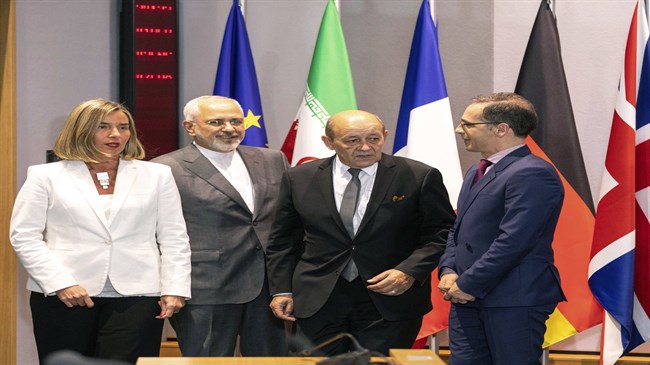
The move by France, Germany and Britain, and supported by the EU comes after Trump in May unilaterally withdrew from the 2015 Iran nuclear accord, which the Europeans, Russia and China continue to support and have pledged to do their utmost to protect.
EU officials on Friday confirmed the plan to create the “special purpose vehicle,” which was first reported by Spiegel, the German news site.
When asked about the financing model, a spokesperson for the German Finance Ministry said, “The German government is working together with the European External Action Service and the European Commission, as well as France and the United Kingdom, on maintaining financial payment channels with Iran. The negotiations on this are intensive and ongoing. There are different models under consideration.
“As you know, it is a central goal of the EU and the German government to ensure that the processing of transactions is secured,” she said during a regular government news conference. “All options are being considered.”
A French official added the EU needed “a financially independent sovereign channel” in order to keep the Iran deal alive.
The plan under review in Berlin and Brussels would involve establishing a kind of clearing house for all European trade with Iran. A form of commercial entity known as a “special purpose vehicle” would be established, with European governments as shareholders.
The new company would act as an intermediary for cross-border payments to and from Iran, with no involvement from European commercial or central banks, which are frightened of becoming the target of American countermeasures.
The clearinghouse is likely to be based in Luxembourg, but its capitalization remains unclear. The European Investment Bank and national development banks, like Germany’s KfW, may be involved, although here too there is genuine fear of American retribution.
One EU official explained that the “special purpose vehicle” would effectively function as an accounting firm, providing a loophole to keep trade flowing between EU countries and Iran. If Italy wanted to buy Iranian oil, it could wire money to the firm, which would handle the rest of the transaction. Iran, similarly, could wire money for the purchase of European products.
The special purpose vehicle would keep the money for the transactions within the EU, and outside the reach of US control over global money-transfer systems. It would also avoid the need to use banks that are afraid of being cut off from doing business in the US financial market if they are accused by the US Treasury Department of violating the sanctions.
A first battery of renewed US economic sanctions took effect against Iran last month, and further sanctions — including sanctions on the Iranian oil sector, a mainstay of the country’s economy — are set to take hold in November.
While the EU has already taken steps to obstruct Trump’s sanctions — including potential penalties against firms that enforce the American sanctions without permission of the European Commission — officials in Europe still fear that the US dominance of the world financial system will block most business with Iran.
Tehran itself has warned the Europeans that they should develop new ways of trading with Iran by early November if they want to preserve the nuclear deal, known as the Joint Comprehensive Plan of Action (JCPOA).
The US wants all businesses and countries around the world to stop doing business with Iran.
News of the EU plan comes only two days after European Commission President Jean-Claude Juncker vowed in his final State of the Union address to increase the role of the euro in international trade, particularly in terms of energy purchases.
Word of the European plan to prop up Iran’s oil industry is certain to further damage the already badly-strained transatlantic relationship.
European governments have rarely acted so decisively in opposition to American foreign policy. Their action is partly motivated by what is viewed as an American attack on European sovereignty. Trump’s government is seen as coercing compliance rather than working out agreed policy.
A determined effort to get around US sanctions would also encourage European businesses to stay the course in Iran.
Reuters, politico.eu and handelsblatt.com contributed to this story.
Source: Iran Daily
9417**1397
Follow us on Twitter @IrnaEnglish
 solhkhabar | Peace International News Agency Peace International News Agency , Peace News , International Agency News of Peace
solhkhabar | Peace International News Agency Peace International News Agency , Peace News , International Agency News of Peace